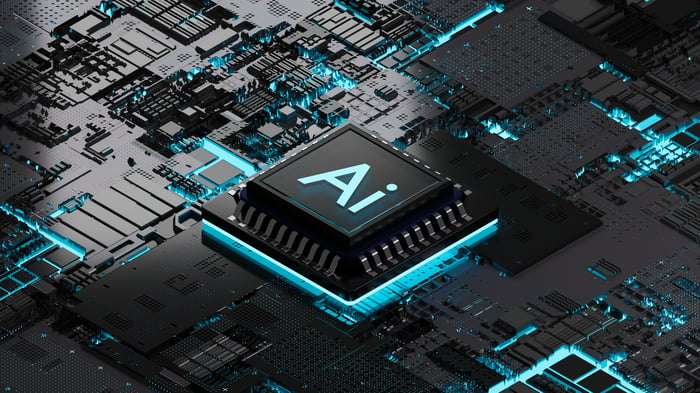Semiconductor stocks witnessed a slight pause in their trajectory as reports emerged of the Biden administration contemplating a cap on advanced chip exports to specific countries. Although this news caused a momentary ripple in the surge of Nvidia (NASDAQ: NVDA), it hardly seemed to deter the upward momentum of Nvidia’s stock.
Taking into account the robust momentum of Nvidia, the question arises: Could a potential export cap have any adverse effects on the company’s path? Let’s delve into the proposal and analyze the potential implications it might hold for Nvidia’s stock.
A Glimpse at the Chip Cap Proposal
As per Bloomberg, the Biden administration is exploring the imposition of restrictions on the sale of certain advanced chips by capping sales to designated countries. This move would involve restricting export licenses to these countries owing to national security apprehensions.
It seems that the countries under scrutiny primarily hail from the Middle East. Interestingly, this development follows the Commerce Department’s recent relaxation of rules to facilitate the Middle East’s access to advanced AI chips.
Over the years, Saudi Arabia has spearheaded the establishment of data centers in the region, aiming to invest a substantial sum in artificial intelligence technology in the near future. With abundant natural gas reserves and burgeoning production capabilities, the country stands poised to provide economical power to AI-centric data centers, aligning well with its ambitious objectives.
Furthermore, earlier this year, the U.S. government prohibited the sale of Nvidia’s latest graphics processing units (GPUs) to specific Middle Eastern countries. Additionally, export bans linking to countries like China and Russia were already in place. The U.S.’s aspiration to lead the AI domain from a national security standpoint justifies the government’s inclination to restrict the sales of advanced AI chips to specific nations.
Effects on Nvidia’s Trajectory
Nvidia stands as a premier advanced chip manufacturer globally, with its GPUs forming the backbone of the infrastructure powering AI-focused data centers. Consequently, any impediment to the sales of advanced chips could potentially affect the company.
Simultaneously, the Middle East has emerged as one of the swiftest burgeoning data-center arenas globally. Analogous to major U.S. tech giants racing to expand data centers to secure AI preeminence, nations like Saudi Arabia and the UAE are enthusiastically pursuing similar ventures.
Likewise, prominent cloud providers are gravitating towards the region. Earlier this year, Amazon sealed a pact with Saudi Arabia to construct data centers in the kingdom, slated to go operational by 2026. Amazon envisions investing more than $5 billion in these projects, focusing on managing workloads for local entities. Alphabet and Microsoft also have a notable presence in the region, with the latter aiding in nurturing the UAE’s sovereign cloud network.
The unrelenting demand for Nvidia’s GPUs implies that the company is likely to witness minimal repercussions in the near to medium term if a chip cap restricting shipments to Middle Eastern countries materializes. Goods earmarked for the Middle East would promptly find takers elsewhere.
Larger U.S. technology firms and well-capitalized AI startups, including OpenAI and xAI, continue to exhibit an insatiable appetite for Nvidia’s GPUs as they hasten the development of their AI infrastructure. The escalating investments in capital expenditure linked to AI infrastructure resonate with industry leaders like Alphabet and Meta Platforms, who express concerns over underinvesting in AI initiatives. Notably, the swelling need for compute power for large language models (LLMs) mandates an augmenting demand for GPUs, placing Nvidia in an incessant struggle to satisfy market needs.

Image source: Getty Images.
Despite a potential chip cap affecting shipments to the region, Middle Eastern countries imperative need for chips to fuel their AI aspirations may prompt Nvidia to sell less sophisticated chips or slightly older technology to bridge the gap. Given Nvidia’s accelerated design cycle of an annual cadence, it could potentially secure clearance to vend its present Hopper chips to these nations in a couple of years, with the next-generation Rubin chip taking the lead in technological advancement.
Furthermore, Nvidia has pioneered AI chips custom-tailored for specific markets such as China, compliant with prevailing export regulations. While this remains a prospective avenue, Nvidia’s focal point at present centers around its cutting-edge chips.
Owing to the prevailing demand for Nvidia’s chips and affirmations from major clients, the stock continues to hold promise, showcasing resilience even in the face of a conceivable chip export cap.
Should You Invest $1,000 in Nvidia at Present?
Before contemplating an investment in Nvidia, it’s prudent to weigh the following:
The analyst team at Motley Fool Stock Advisor has pinpointed what they deem the 10 best stocks for investors to consider now—even though Nvidia didn’t make the cut. The selected stocks present the potential for substantial returns in the forthcoming years.
Reflect on the time when Nvidia made it to this list back on April 15, 2005… If you had invested $1,000 following our recommendation, your investment would have burgeoned to $845,679*!
Stock Advisor equips investors with a straightforward blueprint for prosperity, offering insights on forming a diversified portfolio, recurrent analyst updates, and two fresh stock picks every month. The Stock Advisor service has vastly outstripped the S&P 500 returns since 2002*.
*Stock Advisor returns as of October 14, 2024
